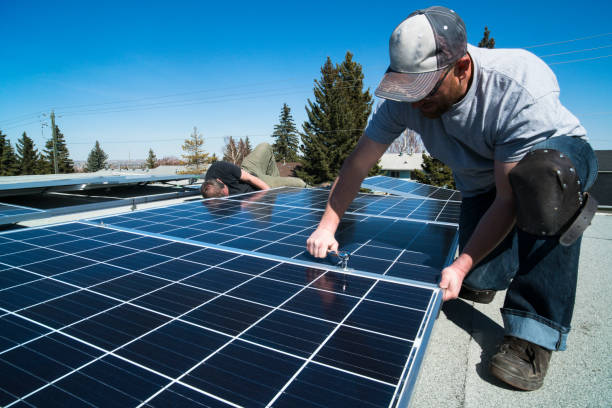USA Scholarship Visa Guide for Aspiring Solar Installers – Your Path to a High-Paying Green Energy Career
The global transition to renewable energy is creating high-demand, well-paying job opportunities, and solar installation is at the forefront. If you’re passionate about sustainable energy and want to build a lucrative career in the U.S., securing a scholarship visa to study solar technology is your golden ticket.
This comprehensive guide will walk you through everything you need to know—from choosing the right solar installation program to landing scholarships and successfully obtaining a U.S. student visa.
Why Solar Energy? A Career with Huge Earning Potential
The solar energy industry in the U.S. is booming, with thousands of companies offering high-paying jobs. The average salary for a solar installer can range from $45,000 to $80,000 per year, with potential for growth into project management roles that pay well over six figures.
With government incentives and rising consumer interest in solar panel installations, now is the best time to enter this field. Studying in the U.S. gives you access to top-tier education, cutting-edge technology, and networking opportunities that can fast-track your career.
Step 1: Choose the Best Solar Installation Programs in the U.S.
To qualify for a U.S. student visa (F-1) and secure a high-income solar job, you need to enroll in an accredited program focused on solar technology, renewable energy, or environmental engineering.
Top Universities & Schools for Solar Energy Studies
Here are some highly ranked U.S. institutions offering specialized training in solar installation and renewable energy:
Massachusetts Institute of Technology (MIT) – Renewable Energy Engineering
Stanford University – Sustainable Energy Systems
University of California, Berkeley – Energy & Resources Program
Arizona State University – Solar Energy Engineering & Commercialization
Community Colleges & Technical Schools – Affordable, hands-on training for solar certification
Key Factors When Choosing a Program:
- Accreditation – Ensures your degree is recognized by employers
- Hands-on Training – Look for programs with solar labs, fieldwork, and internships
- Job Placement Assistance – Schools with industry connections offer a better chance at high-paying jobs
- Scholarship Availability – Some universities provide tuition-free options for international students
Step 2: Secure Scholarships to Study Solar Installation in the U.S.
Studying in the U.S. can be expensive, but scholarships and grants can make it affordable or even free.
Where to Find Solar Energy Scholarships:
- University Scholarships – Many U.S. colleges offer merit-based and need-based financial aid
- Government & Private Grants – Programs like the Fulbright Scholarship and Green Energy Grants
- Industry-Sponsored Scholarships – Organizations such as:
- American Solar Energy Society (ASES)
- Solar Energy Industries Association (SEIA)
L
Local & International Sponsorships – Check programs from your home country
Pro Tips for winning Scholarships:
- Highlight your passion for renewable energy in your application
- Showcase past projects or work experience in solar or sustainability
- Apply early and submit a strong personal statement emphasizing your career goals
Step 3: Apply for Your U.S. Scholarship Visa (F-1)
Once you’ve secured admission and funding, it’s time to apply for your U.S. student visa. The F-1 visa allows international students to study full-time and even work in related fields through Optional Practical Training (OPT).
Visa Application Process (Step-by-Step)
- Receive Form I-20 from your school (proof of admission)
- Complete DS-160 Form (Online Nonimmigrant Visa Application)
- Pay the SEVIS & Visa Fees ($160–$350, depending on location)
- Schedule & Attend Visa Interview at the nearest U.S. embassy
- Prepare Strong Answers for common interview questions like:
- Why do you want to study in the U.S.?
- How will you fund your education?
- What are your career plans after graduation?
🔹 Bonus Tip: Showing strong financial backing and clear career goals increases your chances of visa approval.
Step 4: Preparing for Your Move to the U.S.
Once your visa is approved, it’s time to get ready for life in the U.S. as an international student.
Key Considerations:
Housing: On-campus dorms vs. off-campus apartments
Budgeting: Plan for tuition, rent, food, and transport expenses
Health Insurance: Essential for covering medical expenses in the U.S.
Cultural Adaptation: Join student groups, connect with peers, and attend university orientation
Step 5: Networking & Job Opportunities in the Solar Industry
Networking is key to landing high-paying jobs in the renewable energy sector. Here’s how you can build connections and increase your job prospects:
Join Student Energy Organizations – University-based green energy clubs
Attend Solar Conferences & Trade Shows – Events like Solar Power International (SPI)
Connect with Professors & Industry Experts – They can recommend you for internships
Create a Strong LinkedIn Profile – Showcase your skills, projects, and certifications
Secure Internships Through OPT (Optional Practical Training) – Gain work experience before graduation
Step 6: High-Paying Careers in the Solar Industry
After completing your studies, you’ll have a wide range of career options in the fast-growing solar sector. Here are some top-paying roles:
Solar Installer – $45,000–$80,000/year
Solar Project Manager – $90,000–$120,000/year
Renewable Energy Consultant – $75,000–$100,000/year
Solar Sales Engineer – $70,000–$150,000/year (with commissions)
Research & Development Engineer – $85,000–$130,000/year
Bonus Tip: If you want to stay in the U.S. after graduation, apply for H-1B work visas sponsored by solar companies.
Final Thoughts – Take Action Now!
Studying solar installation in the U.S. opens doors to high-paying, in-demand jobs in the growing renewable energy sector. By following this guide, you can:
- Find the best solar programs
- Secure scholarships to reduce tuition costs
- Successfully apply for a U.S. visa
- Build a powerful network for job opportunities
- Land a high-paying job in the solar industry
